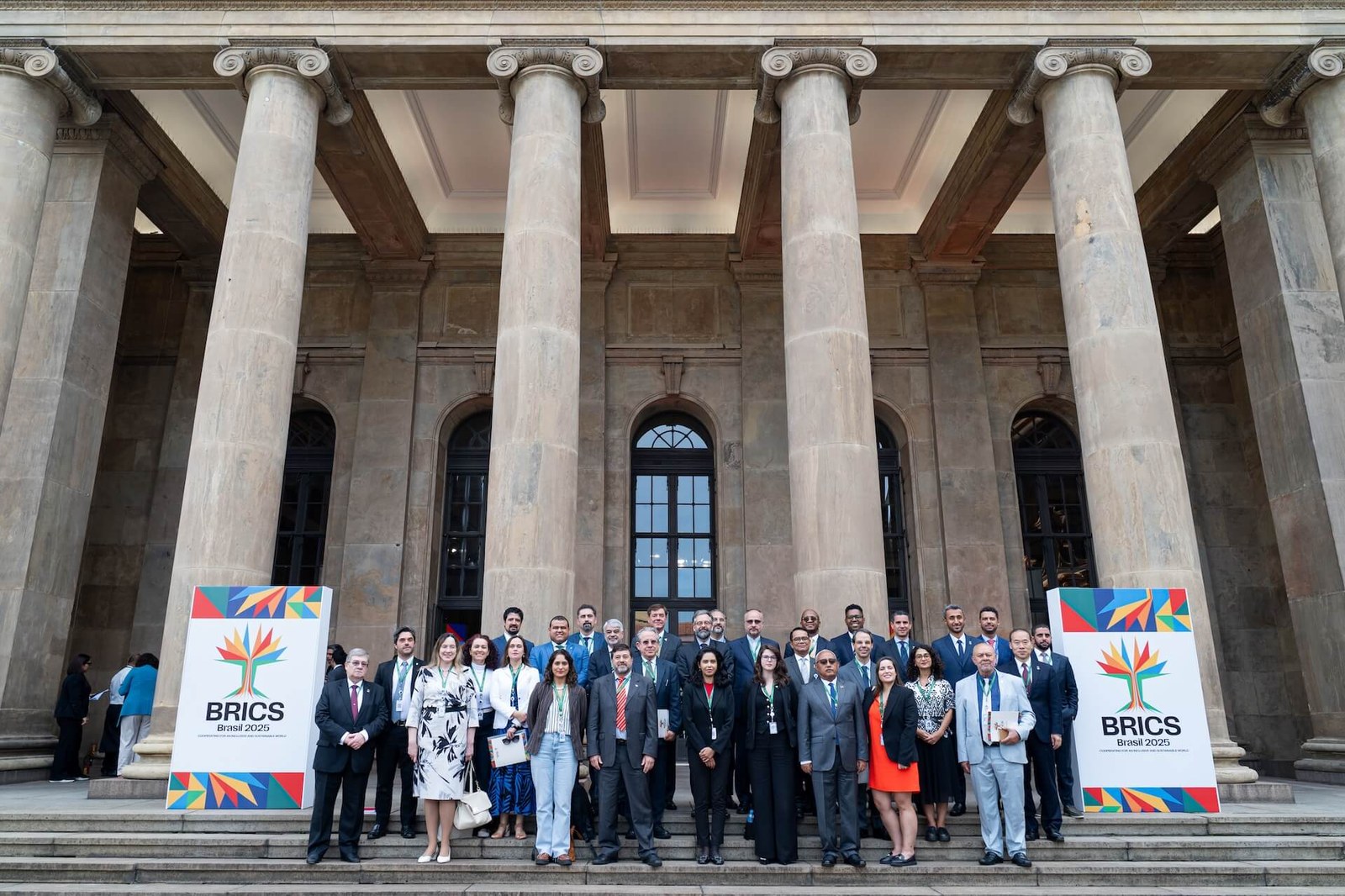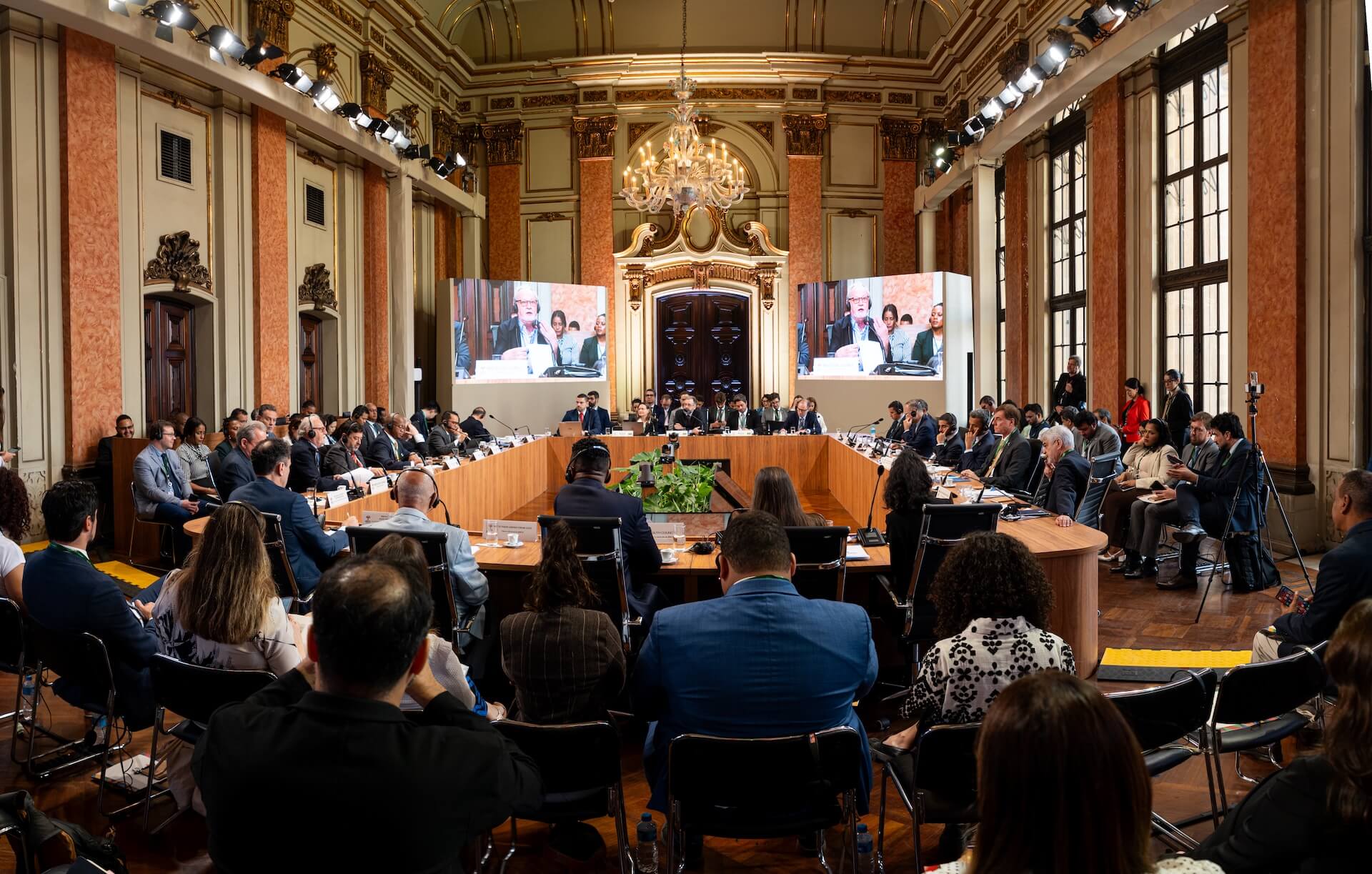Civil Society at BRICS: Brasil promotes unprecedented dialog to align policies to popular demands
For the first time at BRICS, civil society presents proposals directly to the Sherpas. Among the highlights, strengthening the New Development Bank for industrialization projects, social policies, gender equality with expanded spaces for women, and active voice for the youth. Brazilian initiative opens a new chapter in the group’s governance.

By Leandro Molina / leandro.molina@presidencia.gov.br
This week, the Itamaraty Palace in Rio de Janeiro staged a historical landmark in the history of BRICS. For the first time since the establishment of the group, civil society representatives had a formal space to present proposals directly to member country negotiators during the group’s second meeting of Sherpas. The joint session between the Sherpas and leaders from the BRICS People-to-People (P2P) pillar represented a significant change in the way the group incorporates civil society demands in its decision-making process.
"This is an opportunity for us, the negotiators, to listen to what civil society has to say about our work and how we can improve it so that the results of the BRICS can align with what the population wants," stated Mauricio Lyrio, Brasil’s BRICS Sherpa.
"This is an opportunity for us, the negotiators, to listen to what civil society has to say about our work and how we can improve it so that the results of the BRICS can align with what the population wants," stated Mauricio Lyrio, Brasil’s BRICS Sherpa. He highlighted President Lula’s emphasis in arguing that the group must listen more attentively to civil society in order to make decisions that effectively impact people’s lives.
The innovative format allowed for groups representing civil society to present their demands directly to the negotiators. As highlighted by Gustavo Westmann, head of the Special Advisory for International Issues at the General Secretariat of Brasil’s Presidency of the Republic, ten groups were selected based on criteria that combined institutional representativeness and alignment with the priorities established by the Brazilian presidency.
“The criteria used to identify the ten groups was the following: firstly, we made sure that the four large councils were present — the Business Council, the Youth Council, the Civil Council, and the Think Tanks Council. After that, in the light of the priorities established by the Brazilian presidency, we also brought in other forums and meetings. Then, this is basically an opportunity for governmental representatives and non-governmental actors to dialog with the negotiators and also to present concrete proposals to reposition the BRICS in this new global order, filled with complexities," Westmann explained.
Among the participants was João Pedro Stédile, national coordinator of the Landless Workers' Movement (Movimento dos Trabalhadores Rurais Sem Terra/MST). He highlighted that since the 2024 BRICS Summit, held in Kazan, Russia, peoples movements have been holding online events and elaborating documents, which have already been delivered to the Brazilian Ministry of Foreign Affairs for translation into the group’s official languages. Stédile stressed the importance of the goal of the Rio meeting of presenting proposals and establishing a direct dialog channel with government representatives.
"We, the peoples’ movements, have presented, in writing, a synthesis of the themes that were introduced by the Brazilian presidency: education, health, world governance, and technology. And we took the opportunity to call attention to the urgent issues of the current scenario. Furthermore, the movements demanded a more active stance of BRICS against the current conflicts around the world.There is a civilizatory responsibility that requires solidarity,” he declared.
Another demand presented by Stédile is the formalization of the BRICS People’s Council, proposed in Kazan and yet to be regulated. "We must define how many people per country, if there will be a secretariat, resources, and how many meetings per year. The council must operate permanently, regardless of any ideological position from the government that assumes the rotating presidency," he explained.

An innovative space for civil society
Regarding the New Development Bank (NDB), the civil society representatives reached consensus about the role of the financial institution as the main financing agent for industrialization in the Global South. The argument is that, without the industry, it is impossible to reduce poverty or finance family farming, for example. The NBD is expected to become a real alternative to the World Bank and the IMF in financing the development of emerging countries.
Constanza Neri, from Brasil’s National Confederation of Industry (Confederação Nacional da Indústria/CNI) and the Business Women’s Alliance, highlighted the need for greater female participation. "We need more access to credit, training in sustainable agricultural practices, and greater representation in tourism and global health. Women are key to international trade, but they still face many barriers," she assessed.
Nilson Duarte, president of the General Union of Workers of Rio de Janeiro (União Geral dos Trabalhadores do Rio de Janeiro), representing the unions, requested greater attention to social issues. "The New Development Bank must expand funding for social areas, and the unions must be included in the monitoring of public policies. We proposed the institutionalization of a permanent union forum at BRICS," he said.
The youth also had an active voice in the event. Ronald Luiz dos Santos, from Brasil’s National Youth Secretariat, was emphatic. "There is no future for BRICS without the youth. The bloc’s projects must generate real opportunities and our proposals must be considered in the leaders’ decisions. We are talking about our future,” he observed.
Eduardo Tadeu, executive director of the Brazilian Association of Municipalities (Associação Brasileira de Municípios), brought in a local perspective. "Global crises are felt first in the cities. Local governments must have a seat at the table when solutions are being discussed. The BRICS+ Association of Cities and Municipalities is ready to contribute with this new governance," he declared.
The proposals presented during the meeting will be consolidated into official documents and analyzed by the Sherpas in the coming weeks. The Brazilian government stressed that dialog with civil society will continue throughout the Brazilian presidency and that concrete results are expected for the Leaders Summit, scheduled for July 6-7, also in Rio de Janeiro.
Civil society representatives assessed that the Brazilian initiative can leave a lasting legacy to BRICS, transforming the way the group incorporates societal demands in its decision-making process. While the Sherpas resume their technical negotiations, the voices of civil society now echo in the corridors of power, ready to influence the future of one of the most important groups of the contemporary geopolitical landscape.
South African Sherpa and Ambassador Xolisa Mabhongo spoke about the unprecedented dialog between civil society and negotiators during the Rio de Janeiro meeting. "What we had here was an unprecedented encounter among cities, civil society, and the Sherpas,” he said, adding that civil society participation is key in this process. "We saw the passion of the social leaders. Brazil shows us how society must be valued — something that we also experience in Africa,” he said.
Mabhongo pointed out three lessons: the importance of social participation, the seriousness of presented proposals, and the hope that future BRICS presidencies follow the Brazilian model. On the continuity of these dialogs, he stated that the South Africans are already following the example set by Brasil. "During our presidency, we will also promote this type of engagement. BRICS must retain this model." The ambassador’s statement highlights the impact of the Brazilian initiative in repositioning the group as a more inclusive space.
Historical participation
The historical meeting represented both an advancement in BRICS governance and the consolidation of Brasil's leadership in promoting a more inclusive and participatory diplomacy. With its temporary presidency of the group, Brasil demonstrates that it is possible to reconcile the strategic interests of states with the concrete demands of the population, building bridges between governments and civil society in an increasingly complex and multipolar world.
All proposals presented this week in Rio de Janeiro will be taken to the BRICS leaders in the hope that civil society's demands will be incorporated into the group's official discussions. India, which will assume the presidency next year, will be the destination of this coordinated effort.
Also in attendance as civil society representatives were EMBRAER CEO Francisco Gomes, representing the BRICS Business Council; Keiti da Rocha Gomes, from IPEA and the BRICS Think Tanks Council; Hugo Freire, secretary for international issues at the Brazilian Federal Court of Accounts (Tribunal de Contas da União/TCU), representing the BRICS Supreme Audit Institutions (SAIs); Getúlio Vaz, senior advisor on international issues, representing the BRICS Small and Medium Enterprises Forum; Brazilian Senator Humberto Costa (PT-PE), representing the BRICS Parliamentary Forum; and Brazilian Federal Deputy Fausto Pinato (PP-SP), president of the BRICS Parliamentary Front.